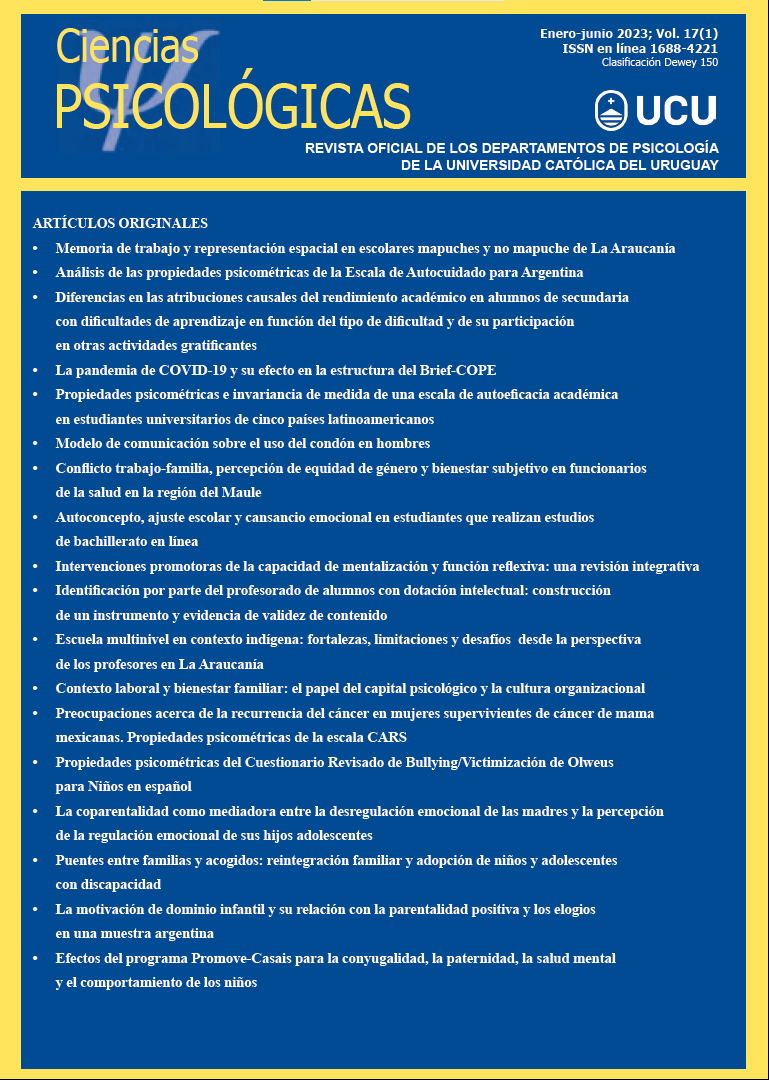Multilevel schools in an indigenous context: strengths, limitations and challenges from the perspective of teachers in La Araucanía
DOI:
https://doi.org/10.22235/cp.v17i1.2841Keywords:
school education, teaching and learning, intercultural education, indigenous culture, indigenous and tribal peopleAbstract
The article presents the main strengths, limitations and challenges of multilevel schools in an indigenous context, from the voices of teachers in La Araucanía, Chile. The methodology is qualitative and involved six semi-structured interviews with teachers. The technique for analyzing the information is content analysis in conjunction with grounded theory. The results reveal the persistence of prejudices towards indigenous families, the teachers’ lack of knowledge about local ways of knowing and the lack of competencies to develop education in an intercultural perspective. We conclude that there is a need for engagement and dialogue between the school, family and community, which would enable a revitalization of the socio-cultural identity in the teaching and learning processes.
Downloads
References
Archibald, J., Lee-Morga, J. B. J., & De Santolo, J. (Eds.). (2019). Decolonizing Research Indigenous Storywork as Methodology. Zed Books.
Arias-Ortega, K. & Ortiz, E. (2022). Intervenciones educativas interculturales en contextos indígenas: aportes a la descolonización de la educación escolar. Revista Meta: Avaliação, 14(42), 193-217.
Arias-Ortega, K. & Quintriqueo, S. (2021). Relación educativa entre profesor y educador tradicional en la Educación Intercultural Bilingüe. Revista electrónica de investigación educativa, 23, 1-14. https://doi.org/10.24320/redie.2021.23.e05.2847
Arias-Ortega, K. (2020). Sentido de la escuela y la educación escolar en contexto indígena. Bases para una relación educativa intercultural. Proyecto Fondecyt de Iniciación 2020-2023.
Barrios, B. (2019). Educación intercultural: ¿Un espacio de encuentro o un campo de luchas? Revista Nuestra América, 7(14), 102-127.
Commission de Vérité et Réconciliation du Canada. (2015). Honorer la vérité, réconcilier pour l’avenir: Sommaire du rapport final de la Commission de vérité et réconciliation du Canada. McGill-Queen's Press-MQUP.
Delprato, M. (2019). Parental education expectations and achievement for Indigenous students in Latin America: Evidence from TERCE learning survey. International Journal of Educational Development, 65, 10-25. https://doi.org/10.1016/j.ijedudev.2018.12.004
Denzin, N. & Lincoln, Y. (2018). The SAGE Handbook of Qualitative Research. SAGE.
Denzin, N., Lincoln Y., & Smith, L. (2008). Handbook of critical indigenous methodologies. SAGE.
Dillon, A., Craven, R., Guo, J., Yeung, A., Mooney, J., Franklin, A., & Brockman, R. (2022). Boarding schools: A longitudinal examination of Australian Indigenous and non-Indigenous boarders’ and non-boarders’ wellbeing. British Educational Research Journal, 48(4), 751-770. https://doi.org/10.1002/berj.3792
EagleWoman, A., Terry, D. J., Petrulo, L., Clarkson, G., Levasseur, A., Sixkiller, L. R., & Rice, J. (2022). Storytelling and Truth-Telling: Personal Reflections on the Native American Experience in Law Schools. Mitchell Hamline Law Review, 48(3), 1-9.
Harcourt, M. (2020). Teaching and learning New Zealand's difficult history of colonisation in secondary school contexts [Tesis de doctoral, Victoria University of Wellington]. http://hdl.handle.net/10063/9109
Mallick, B., Popy, F. B., & Yesmin, F. (2022). Awareness of Tribal Parents for Enrolling Their Children in Primary Education: Chittagong Hill Tracks. Advances in Social Sciences Research Journal, 9(3), 101-109. https://doi.org/10.14738/assrj.93.11905
Manning, R. & Harrison, N. (2018). Narrativas de lugar y tierra: enseñanza de historias indígenas en la formación de profesores de Australia y Nueva Zelanda. Revista Australiana de Formación del Profesorado, 43(9). http://dx.doi.org/10.14221/ajte.2018v43n9.4
Matengu, M., Korkeamäki, R., & Cleghorn, A. (2019). Conceptualizing meaningful education: The voices of indigenous parents of young children. Learning, Culture and Social Interaction, 22, 100242. https://doi.org/10.1016/j.lcsi.2018.05.007
Meghan, S. (2022) Deficit discourses and teachers’ work: the case of an early career teacher in a remote Indigenous school. Critical Studies in Education, 63(1), 64-79. https://doi.org/10.1080/17508487.2019.1650383
Milne, E. & Wotherspoon T. (2022). Student, parent, and teacher perspectives on reconciliation-related school reforms. Diaspora, Indigenous, and Minority Education, 17(1), 54-67. https://doi.org/10.1080/15595692.2022.2042803
Sabzalian, L. (2019). Indigenous Children´s Survivance in Public Schoools. Routledge.
Sukhbaatar, B. & Tarkó, K. (2022). Teachers’ experiences in communicating with pastoralist parents in rural Mongolia: implications for teacher education and school policy. Asia-Pacific Journal of Teacher Education, 50(1), 34-50, https://doi.org/10.1080/1359866x.2020.1818056
Downloads
Published
How to Cite
Issue
Section
License
Copyright (c) 2023 Universidad Católica del Uruguay

This work is licensed under a Creative Commons Attribution 4.0 International License.
















